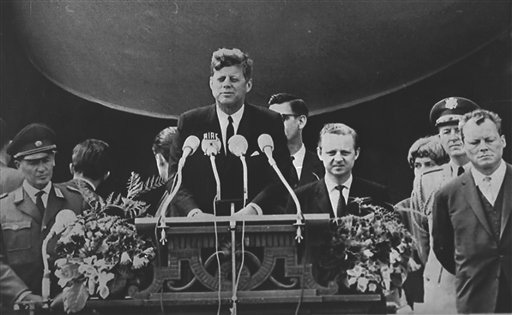How Great Leaders Evolved

Humans are creatures who need leaders. Like most primates, that is lemurs, monkeys and apes, humans live in social groups, and these groups are essential for our survival. We don't just stand around in a herd, pushing and shoving each other to get into the middle and away from preying lions. Instead, for us, a social group is all about connecting with other primates. In fact, our interpersonal connections are so extensive and complicated that we need rules to govern the way we interact; without these rules there would be chaos. And so we primates usually form rank hierarchies, and we need someone to take the lead. Researchers first understood how important leaders were to our kind back in the 1970s when primatologists began to spend long hours watching monkeys and apes in far-flung places. Jane Goodall had, of course, been talking about the socially complicated lives of chimpanzee for more than a decade by then, but everyone thought chimps were a special, almost human case. But once the data were in, it became clear that even lemurs and monkeys followed social rules that looked awfully familiar. For example, female macaques clearly run their lives along strict hierarchies with some monkeys on top and some on the bottom. That rank order is reinforced daily by interactions over a place to sit or a friend to groom, by threats from on high, and by repeated scraping and bowing by those of low rank. Macaque female hierarchies are also inflexible; a monkey has to belong to the "right" group to get anywhere and it takes a special individual to come from nothing to rise out of her place. It also became clear from the data that everyone wanted to get to the top, but only special monkeys did a good job in that position. I remember watching the lead female of a group of bonnet macaques at the University of California, Davis Primates Center as she terrorized all the other female in the troop who were not related to her. She even chewed off some of their faces. And then one day the veterinarians decided to pull her out, and overnight the cage became peaceful again, became a social group that operated more for the good of all rather than for a select few. Good leader monkeys are also wise monkeys. They have been known to guide the troop to valuable resources such as food and water during hard times, and to teach young animals the ropes. Primatologists were also able to explain why everyone wanted to be in charge. Males and female of high rank have, on average, more babies and pass on more genes than those of lower rank. And so the compelling desire to become a good primate leader, and exhibit all the behaviors and qualities it takes to get and hold that position, has obviously been selected for evolutionary reasons among our primate relatives. And for some human leaders, those monkey and ape advantages hold as well. Human leaders can gain great wealth, a comfortable life, and a bunch of wives and children if they choose. But for other human leaders, it's not about the individual evolutionary advantages but about helping the whole troop. And in that choice, those leaders underscore that they, too, know what it's all about to be successful social animal.
- Video - Scientists Train Chimp Minds
- Top 10 Most Powerful Women Leaders
- The Freakiest Lab Animals
Meredith F. Small is an anthropologist at Cornell University. She is also the author of "Our Babies, Ourselves; How Biology and Culture Shape the Way We Parent" (link) and "The Culture of Our Discontent; Beyond the Medical Model of Mental Illness" (link).
Sign up for the Live Science daily newsletter now
Get the world’s most fascinating discoveries delivered straight to your inbox.









